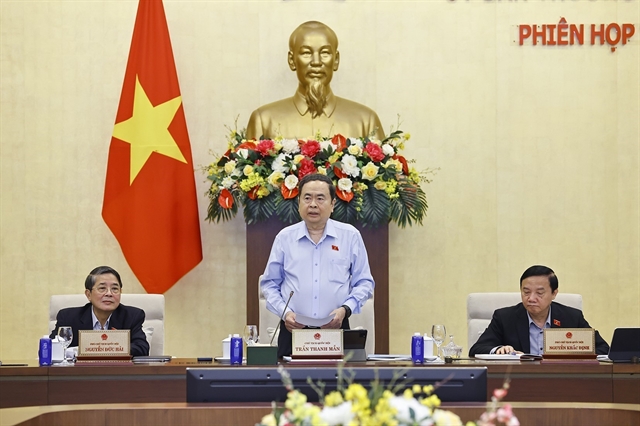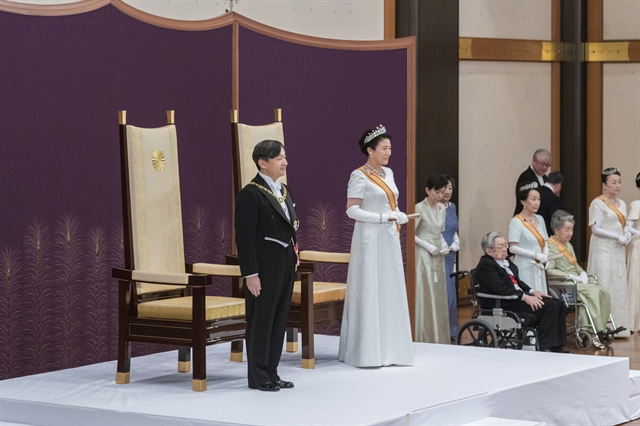 World
World

Emperor Naruhito succeeded to the Chrysanthemum Throne yesterday and pledged to stand with his people following the example set by his father, who abdicated the previous day as the first Japanese monarch to do so in 202 years.

|
| Japan's new Emperor Naruhito (first left) and Empress Masako (second left) attend a ceremony to receive the first audience after the accession to the throne, at the Imperial Palace in Tokyo, Japan, yesterday. Japan's Emperor Naruhito declared his succession to the Chrysanthemum Throne yesterday to mark the start of a new imperial era in Japan. - XINHUA/VNA Photo |
TOKYO Emperor Naruhito succeeded to the Chrysanthemum Throne yesterday and pledged to stand with his people following the example set by his father, who abdicated the previous day as the first Japanese monarch to do so in 202 years.
The 59-year-old emperor, the first to be born after World War II and to have studied overseas, also vowed in an enthronement ceremony to fulfill the symbolic, nonpolitical role in accordance with the postwar Constitution.
"In acceding to the throne, I swear that I will reflect deeply on the course followed by his majesty the emperor emeritus (Akihito) and bear in mind the path trodden by past emperors, and will devote myself to self-improvement," he said in his first speech after enthronement.
"I also swear that I will act according to the Constitution and fulfill my responsibility as the symbol of the state and of the unity of the people of Japan, while always turning my thoughts to the people and standing with them," he said during the "Sokui go Choken no gi" rite.
He was flanked by Empress Masako, 55, a Harvard- and Oxford-educated former diplomat.
The ceremony at the "Matsu no Ma" stateroom in the Imperial Palace was attended by roughly 300 people, including the heads of the government, legislature and judiciary.
Other imperial family members, including the emperor's brother Crown Prince Fumihito, 53, his wife Crown Princess Kiko, 52, and their two daughters, were also present.
Following the emperor's speech, Prime Minister Shinzo Abe congratulated him on his enthronement on behalf of the people, and promised to create a "bright future" that is peaceful and full of hope by respecting him as a symbol of the state.
In the preceding ceremony known as "Kenji to Shokei no gi", the emperor, dressed in a black tailcoat and wearing a number of decorations marking his status, inherited the imperial regalia as proof of his ascension to the throne.
The regalia, called "Sanshu no Jingi", consist of the sacred mirror, sword and jewel. The original mirror is kept at Ise Jingu, a Shinto shrine in Mie Prefecture, central Japan, and the sword at Atsuta Jingu in Nagoya, Aichi Prefecture.
In the ritual, the jewel and a replica of the sword were passed to the new monarch together with the state and privy seals. At the same time, an aide to the emperor visited a shrine inside the Imperial Palace where a replica mirror is kept.
Both ceremonies lasted less than 10 minutes.
In addition to government officials, only adult men from the imperial family - the crown prince and his uncle Prince Hitachi, 83 - attended the inheritance ceremony for the regalia and seals, following the precedent set at former Emperor Akihito's enthronement in 1989.
People across Japan celebrated the emperor's ascension and start of the Reiwa Era at a plethora of celebratory events.
The public will have to wait until Saturday to greet the new emperor and empress, who will make their first public appearances at the Imperial Palace during the Golden Week holiday through Monday. The annual holiday has been extended this year to 10 days to celebrate the imperial succession.
Emperor Akihito stepped down midnight Tuesday, bringing an end to the Heisei Era spanning his 30-year reign.
"I have performed my duties as the emperor with a deep sense of trust in and respect for the people, and I consider myself most fortunate to have been able to do so," the emperor said in his last speech on Tuesday.
In modern Japan, imperial era names, or "gengo", are widely used in Japanese calendars, on coins and on official documents, and the new name was announced on April 1 to facilitate changes to these. Reiwa is translated by the government as "beautiful harmony".
A series of ceremonies and events for the imperial succession are scheduled in coming months, including the "Sokuirei Seiden no gi", to proclaim the enthronement of the emperor in the palace's state hall on October 22.
Former Emperor Akihito, enthroned aged 55 on January 8, 1989, a day after his father Emperor Hirohito died, indicated his wish to abdicate in an August 2016 video address, saying he might not be able to fulfill his duties due to his advanced age. In 2017, Japan enacted one-off legislation to enable him to step down.
Vietnamese Party General Secretary and President Nguyễn Phú Trọng on Tuesday sent his letter to Japanese King Father Akihito.
The letter was occasioned by the latter’s abdication and becoming the King Father.
In his letter, the leader thanked King Father Akihito’s fine sentiment to the land and people of Việt Nam, and highly valued the historical significance of his first Việt Nam visit in 2017 when he was reigning.
Congratulations
Asian leaders offered congratulations to Japan's new Emperor Naruhito, who ascended the Chrysanthemum Throne yesterday a day after his father Akihito abdicated.
South Korean President Moon Jae-in said in a message of celebration that he expects Emperor Naruhito to continue to walk toward peace as his father did, according to the Foreign Ministry.
He also asked the new emperor to pay much attention and affection in developing ties between the two countries, which have been strained by Japan's wartime past.
Chinese President Xi Jinping sent a congratulatory telegram in which he said both countries "have a long history of friendly exchanges".
"The two sides should work together to promote peaceful development and create a bright future for bilateral relations," Xi said in the telegram, according to Chinese media.
Singapore Prime Minister Lee Hsien Loong, in a letter dated yesterday, extended his "warmest congratulations on Your Majesty's accession to the throne", according to the city-state's Foreign Ministry.
"As we celebrate the auspicious dawn of your reign, I am confident that the relations between our two countries will reach even greater heights. May the Japanese people achieve their aspirations of peace and unity in the new Reiwa era," he wrote. KYODO/AFP




